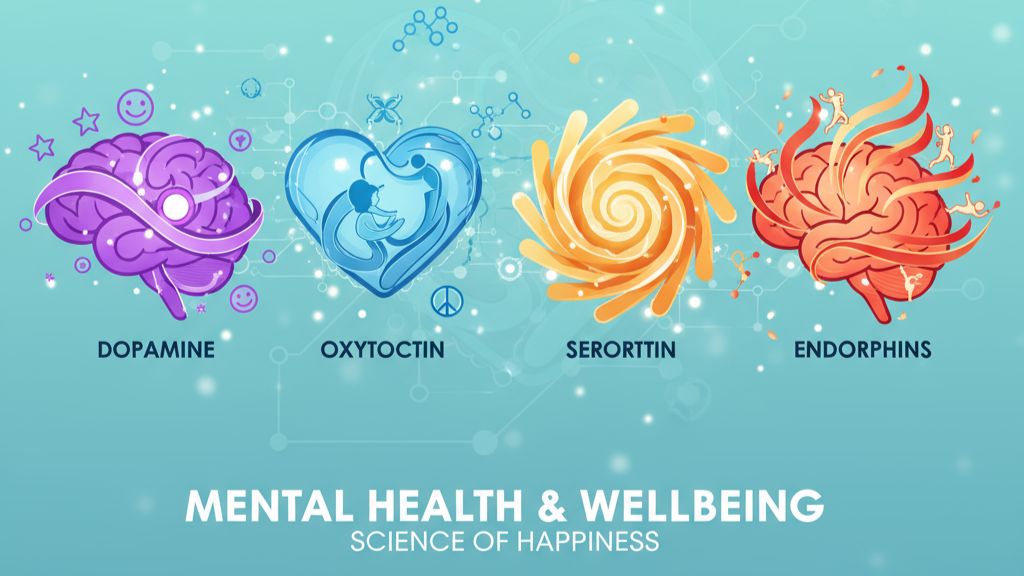Importance of Dopamine, Oxytocin, Serotonin, and Endorphins in Life
Dopamine, Oxytocin, Serotonin, and Endorphins are all neurotransmitters that play important roles in human behavior, mood, and physical health. Here’s a brief overview of the functions of each of these chemicals:
Dopamine:
Dopamine is a neurotransmitter that is involved in a variety of processes in the brain and body. It is often referred to as the “reward chemical” because it is involved in the feeling of pleasure and reward. Dopamine is produced in several areas of the brain, including the substantia nigra and the ventral tegmental area. Dopamine is involved in a variety of processes, including movement, attention, and learning.
Dopamine plays a role in a wide range of functions, including:
1. Movement: Dopamine is involved in the control of movement and is particularly important in the regulation of fine motor skills.
2. Motivation: Dopamine is involved in the motivation to seek out rewards and is thought to play a key role in the development of addictive behaviors.
3. Mood: Dopamine is also involved in regulating mood and is thought to play a role in depression and other mood disorders.
4. Attention: Dopamine is involved in attention and focus, and disruptions in dopamine function can lead to problems with attention and concentration.
5. Learning: Dopamine is also involved in learning and memory, particularly in the formation of new memories.
Dopamine is an important neurotransmitter that is involved in a wide range of functions in the brain and body. Disruptions in dopamine function can lead to a range of mental health and neurological problems, including Parkinson’s disease, schizophrenia, and addiction.
Oxytocin:
Oxytocin is a hormone and neurotransmitter that is often referred to as the “love hormone” or “cuddle chemical” because it is associated with social bonding, trust, and empathy. It is released during physical touch, including hugs, sex, and breastfeeding. Oxytocin is produced in the hypothalamus and released by the pituitary gland. Oxytocin is also involved in maternal behavior and has been shown to promote trust, empathy, and generosity.
Oxytocin plays a role in a variety of physiological and psychological functions, including:
1. Social bonding: Oxytocin is involved in social bonding and attachment, and is released during physical touch, such as hugs, sex, and breastfeeding.
2. Trust: Oxytocin has been shown to increase trust and cooperation between people, and to reduce feelings of social anxiety.
3. Empathy: Oxytocin is thought to increase feelings of empathy and compassion towards others.
4. Stress regulation: Oxytocin has been shown to reduce stress levels and to promote feelings of relaxation and calm.
5. Reproduction: Oxytocin plays a key role in reproductive functions, including the initiation of labor and the release of breast milk.
Oxytocin is an important hormone and neurotransmitter that is involved in social bonding, trust, and empathy. Disruptions in oxytocin function have been linked to a range of mental health and social problems, including social anxiety, autism spectrum disorders, and postpartum depression.
3. Serotonin:
Serotonin is a neurotransmitter that is involved in mood regulation, appetite, and sleep. It is often called the “happiness chemical” because it is associated with feelings of well-being and contentment. Serotonin is also involved in the regulation of social behavior, including aggression and social dominance. Serotonin is produced in the brain and in certain cells in the gastrointestinal tract.
Serotonin plays a role in a wide range of functions, including:
1. Mood regulation: Serotonin is involved in regulating mood, and disruptions in serotonin function have been linked to depression, anxiety, and other mood disorders.
2. Appetite and digestion: Serotonin plays a role in appetite and digestion, and disruptions in serotonin function can lead to problems with eating, digestion, and bowel function.
3. Sleep: Serotonin is involved in regulating sleep, and disruptions in serotonin function can lead to problems with sleep, including insomnia.
4. Pain regulation: Serotonin is involved in pain regulation and can help to reduce the perception of pain.
5. Social behavior: Serotonin has been shown to play a role in social behavior, including aggression, dominance, and cooperation.
Serotonin is an important neurotransmitter that is involved in a wide range of functions in the brain and body. Disruptions in serotonin function have been linked to a range of mental health and physiological problems, including depression, anxiety, eating disorders, and irritable bowel syndrome.
Endorphins:
Endorphins are neurotransmitters that are involved in pain relief and feelings of euphoria. They are often released during exercise, laughter, and other pleasurable activities. Endorphins are sometimes called the “natural painkillers” because they can help to reduce pain and improve mood.
Endorphins play a role in a variety of functions, including:
1. Pain regulation: Endorphins are released in response to pain and can help to reduce the perception of pain.
2. Stress reduction: Endorphins can help to reduce stress and promote feelings of relaxation and well-being.
3. Exercise: Endorphins are released during exercise and are thought to be responsible for the “runner’s high” that some people experience.
4. Sleep: Endorphins are involved in regulating sleep, and disruptions in endorphin function can lead to problems with sleep.
5. Mood regulation: Endorphins can help to regulate mood and may play a role in the development of depression and other mood disorders.
Endorphins are an important group of neurotransmitters that are involved in pain regulation, stress reduction, exercise, sleep, and mood regulation. They are produced naturally in the body and can be increased through activities such as exercise, laughter, and social interaction.
These neurotransmitters are important for maintaining physical and mental health and well-being. They can help to promote positive emotions, social bonding, and physical health. However, imbalances or disruptions in these chemicals can also contribute to a range of mental health issues, including depression, anxiety, and addiction.



















